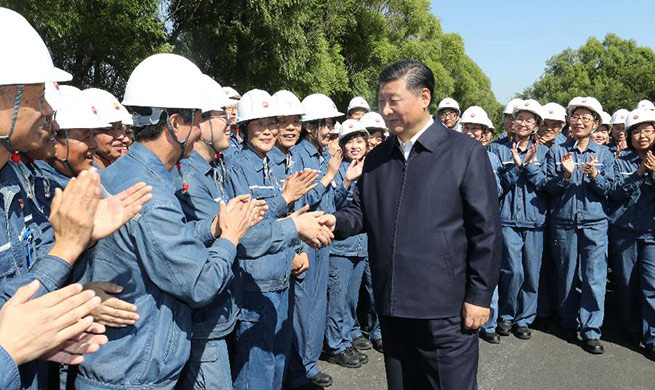CHICAGO, Sept. 28 (Xinhua) -- The Chicago Purchasing Managers Index (Chicago PMI), also known as Chicago Business Barometer, fell to a five-month low of 60.4 in September as production and new orders decelerated.
Many surveyed U.S. firms complained that higher tariffs imposed by Trump administration hampered their production lines.
The Chicago PMI declined 3.2 points from August's 63.6, according to a statement released on Friday by the Institute for Supply Management Chicago.
The barometer is considered to be a leading indicator of the U.S. economy. It is made up of production, new orders, order backlogs, employment and supplier deliveries indicators and is designed to predict future changes in U.S. gross domestic product.
Moderations in both production and new orders, alongside weaker hiring sentiment, were accountable for the barometer's decline.
Still, the Chicago PMI continues to indicate "strong overall business conditions," with all key measures of activity above their respective long-run levels, said the statement.
However, firms said tariffs continued to push prices higher alongside material shortages, while sourcing electrical components proved particularly difficult.
"Supply-side frustrations continue to hamper firms' production lines and the majority of firms expect delivery times to lengthen further, anticipating ongoing trade disruptions to continue weighing on their suppliers," said Jamie Satchi, economist at MNI Indicators, which compiles data for Chicago PMI on behalf of the Institute for Supply Management Chicago.
The finding echoed worries of many U.S. business leaders that unilateral tariffs on its major trading partners including Mexico, Canada and China will eventually hurt the U.S. economy.
China, in a recently released white paper, also pointed out that trade protectionism will ultimately hurt U.S. interests.
Thanks to economic globalization, economies, particularly the larger ones, are highly interdependent. Ultimately, trade wars unilaterally initiated by the U.S. administration will not only hurt other economies but also undermine U.S. interests, said the white paper.













